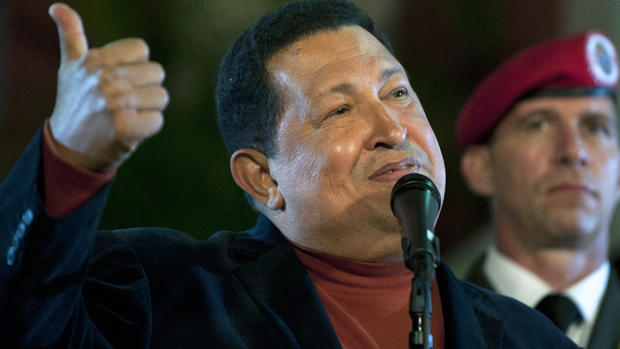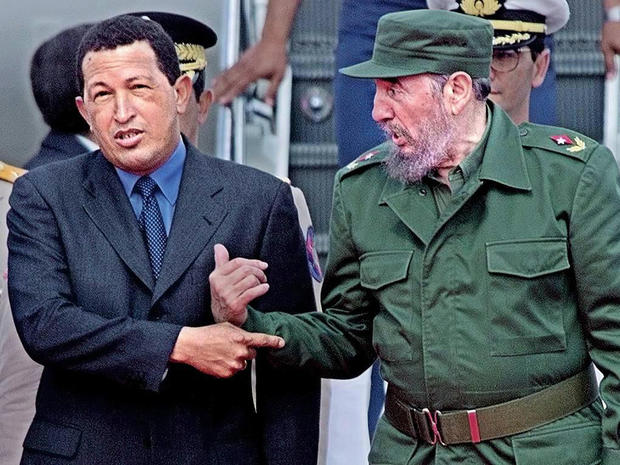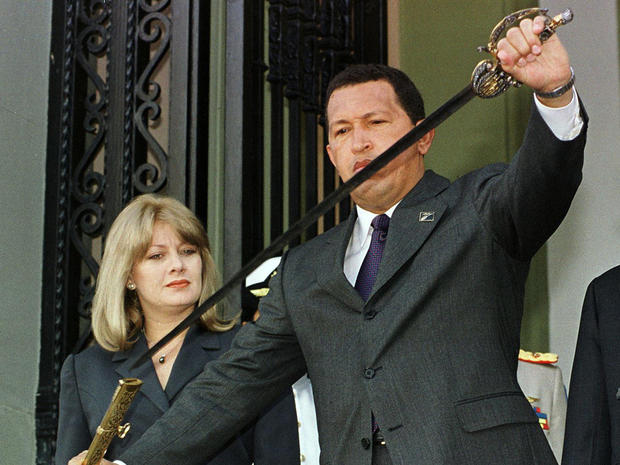Hugo Chavez, Venezuelan leader and U.S. foil, dies
Updated 9:24 PM ET
Hugo Chavez, president of Venezuela for the last 14 years, died Tuesday following his treatment for cancer. His death was announced by the country's vice president Nicolas Maduro, ending a months-long period of speculation surrounding his health -- a period often marked by secrecy and rumor. He was 58.
The popular but controversial leader had won his fourth presidential term in 2012 but was never sworn in due to his failing health.
The career military officer-turned-politician won friends and enemies as he launched poverty-fighting programs, nationalized key industries and forged alliances with other leftist leaders in Latin America -- particularly the Castro brothers in Cuba.
The Associated Press reported that Maduro will serve as interim president and that elections will be called within 30 days, Foreign Minister Elias Jaua told the Telesur network.
- Venezuela expels 2 U.S. officials amid spy accusation
- Venezuela: Chavez's condition "very delicate"
- Many Venezuelans believe in Chavez recovery
- Chavez opponents demand answers about his cancer
In a statement issued by the White House, President Obama said: "At this challenging time of President Hugo Chavez's passing, the United States reaffirms its support for the Venezuelan people and its interest in developing a constructive relationship with the Venezuelan government. As Venezuela begins a new chapter in its history, the United States remains committed to policies that promote democratic principles, the rule of law, and respect for human rights."
Rep. Mike Rogers, the chairman of the House Intelligence Committee, issued a statement following news of Chavez's death: "Hugo Chavez was a destabilizing force in Latin America, and an obstacle to progress in the region. I hope his death provides an opportunity for a new chapter in U.S.-Venezuelan relations."
Just hours before Chavez' death was announced, Venezuelan Vice President and Chavez chosen successor Nicolas Maduro suggested the fatal cancer may have been introduced by "enemies" and declared two U.S. diplomats persona non grata accusing them of trying to organize government opposition among the Venezuelan military.
Chavez's political development took him from social democracy to what he called "Socialism of the 21st Century." His opponents, mostly from the upper-middle class and the wealthy, accused him of becoming a dictator in the mold of his mentor, Fidel Castro, who Chavez once described as being like a father to him.
In a 2002 profile on "60 Minutes," Chavez acknowledged his polarizing effect.
"I have been compared to Hitler, the devil himself. And what I do is struggle for a people. I am a true democrat," he told Steve Kroft.
- Hugo Chavez: The 60 Minutes interview
- Venezuelans in U.S. hopeful of change after Chavez's death
- From botched coup to top boss, key Chavez moments
Toward the end of his life, Chavez's health was treated as a state secret. He had four operations since June 2011, including one that removed a baseball-sized tumor from his pelvic region. Chavez returned to Venezuela Feb. 18 following his most recent surgery in Cuba, performed in December, and was undergoing further treatment at a military hospital in Caracas for what government officials described as a respiratory infection. Aside from several pictures released by the government, Chavez had been unseen by the public for months.
Chavez came to prominence in 1992 when he tried to overthrow then-President Carlos Andres Perez amid growing anger at the government's austerity measures. The coup failed but his message struck a chord with the 19 million Venezuelans living in poverty.
Chavez rose to power over the next six years with his fiery, populist stands against the rich and was elected president in 1998. He moved quickly to tighten control over the country's lucrative state-run oil industry, using the money to open free health clinics and expand social programs.
A new constitution backed by Chavez won a referendum with 72 percent of the vote, although there was only a 50 percent voter turnout. The new document included increased protection for indigenous peoples and women and established the right to education, housing, health care and food.
His strength lay with the country's poor. United Nations statistics show that by 1997, the year before Chavez won his first run for the presidency, the per capita income for Venezuelan citizens had fallen to $2,858 from $5,192 in 1990. Poverty levels had increased by 17.65 percent since 1980 and homicide and other crime rates had more than doubled since 1986, particularly in Caracas. The ground was ripe for the emergence of a populist leader. After his election, he launched a weekly television program -- "Hello President" -- where citizens could call in.
Although full of bravado and revolutionary rhetoric, Chavez's early policies could be described as moderate, capitalist and center-left. But his language turned increasingly radical, and defined himself as anti-imperialist and generally anti-capitalist.
In his second term in office Chavez forged tighter ties with Cuba. Closer relations with the socialist island went hand-in-hand with deteriorating relations with the United States. In 2006, continuing his outspoken criticism of the U.S., Chavez called then-President George W. Bush a "donkey."
Adding to the tension was Chavez's long list of dubious friends over the years - a who's who of America's enemies - from Mahmoud Ahmadinejad in Iran, Muamaar Qaddafi in Libya, and Iraq's Saddam Hussein.
Chavez's self-styled revolution angered the opposition. He was accused of being a "messiah" and out of touch. In 2002, the opposition attempted to unseat Chavez, throwing him in jail in a bloodless coup.
In the days preceding the coup, the five main private Venezuelan TV stations gave advertising space to those calling for anti-Chavez demonstrations. The United States immediately extended recognition to the new government, which claimed Chavez had resigned. But Chavez supporters, both military and civilian, took back control of the presidential palace and freed him from the military barracks where he was being held.
He returned to Caracas in triumph.
Petroleum production loomed large over his tenure. Venezuela was, at the beginning of the 21st century, the world's fifth largest crude oil exporter. Oil accounted for around 85 percent of the country's exports. Chavez's predecessors tried to privatize the industry and U.S. corporations held significant control.
Chavez, however, set out to curb foreign control over Venezuela's natural resources by nationalizing much of it under the state-run oil company, Petroleos de Venezuela (PdVSA). By 2006, PdVSA had forced private corporations to relinquish at least 51 percent of their control over their 32 operating agreements dating back to the 1990s.
In 2007, Chavez founded and became the leader of United Socialist Party of Venezuela (PSUV). This, along with a crackdown on freedom of the press the previous year, led to opposition fears that he was planning to copy Cuba's single-party system and its tight control over civil rights.
Chavez supported Latin American and Caribbean cooperation and developed close ties with Evo Morales in Bolivia, Rafael Correa in Ecuador and Daniel Ortega in Nicaragua, in addition to Fidel and then Raul Castro in Cuba.
He was instrumental in setting up the pan-regional Union of South American Nations, The Bolivarian Alliance for the Americas, The Bank of the South, and the regional television network TeleSur.
Chavez had a Twitter account with more than 1 million followers. Availability of Internet service in Venezuela rose by 43 percent in 2010 and the government set up nearly 700 community centers with computers and free Internet connections, with more planned.
One problem not solved by the Chavez administration was crime. Homicide rates were said to have more than doubled under his watch. Kidnappings also became more common. The construction of new homes and schools in Caracas' slums ran behind schedule.
However, though a polarizing force at home and abroad, there is no doubt that Chavez was an exceedingly popular leader, especially among poor and working class Venezuelans.
He leaves behind four children, three grandchildren and a nation forever marked by his 14-year reign.


